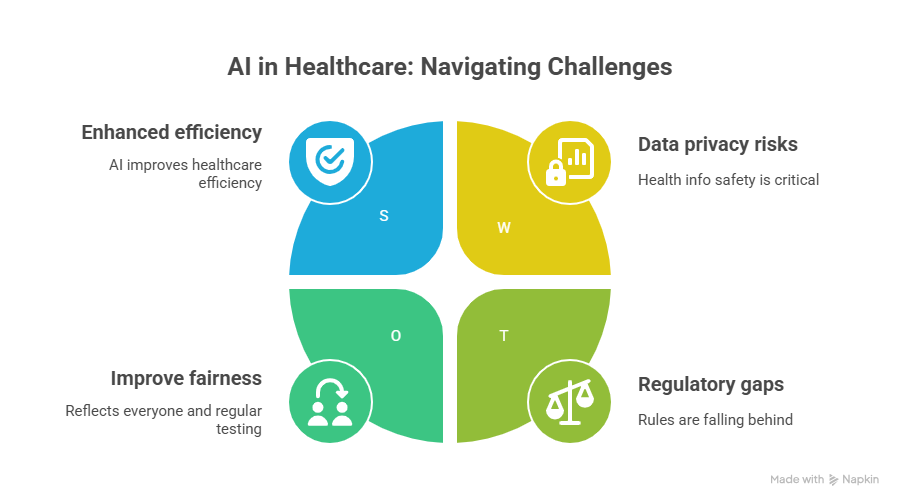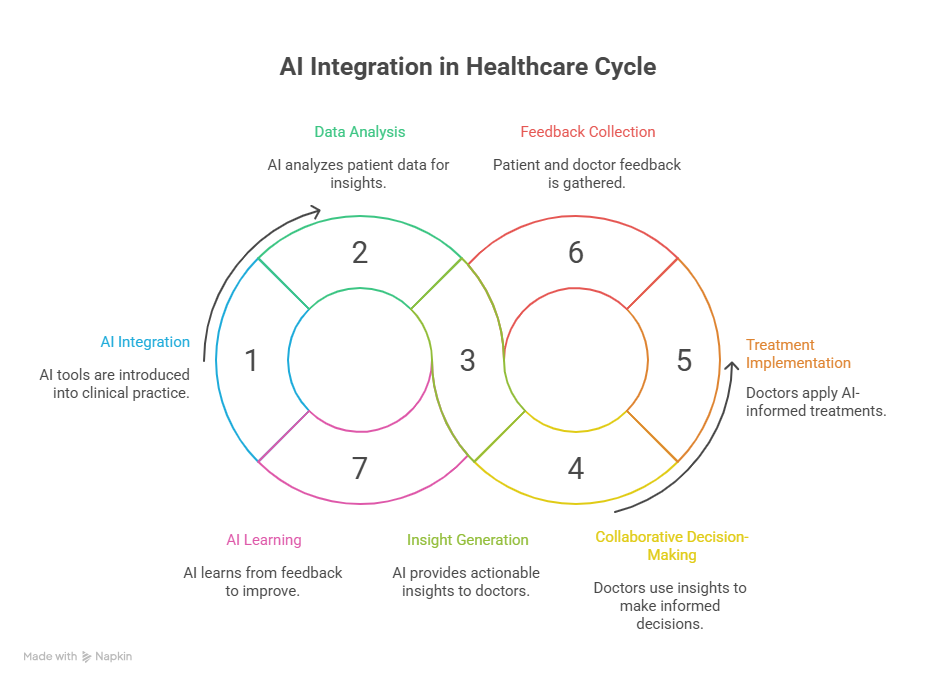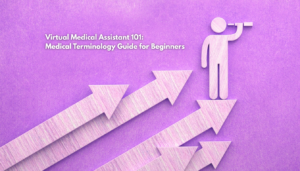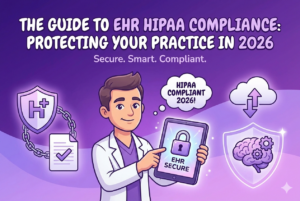AI and Automation in Healthcare: Transforming Patient Care and Efficiency
30 Jul 2025 By: Mary Dellosa
Updated

AI and automation are used in healthcare to improve diagnosis, personalize treatment, and reduce the day-to-day workload on clinical teams. They can analyze medical images to spot issues earlier, predict who is at risk for conditions like sepsis, and automate tasks like documentation, scheduling, and claims processing. For example, an AI voice tool can generate a visit note during an appointment and update the EHR automatically, giving clinicians more time to focus on the patient.
Revolutionizing Diagnostics with AI
Enhancing Accuracy and Speed in Medical Imaging
One of the clearest ways AI helps in healthcare is by reading medical images. Doctors in radiology and dermatology use it to find things like tumors or skin cancer. AI tools can find lung cancer early in CT scans or catch eye damage from diabetes, often as well as top doctors.
By utilizing AI and automation in healthcare, we can improve early diagnosis and treatment options for patients at risk.
Predictive Analytics for Early Disease Detection
AI and automation in healthcare is also changing how we prevent illness. By studying health records, genes, and habits, it can spot people at risk for things like heart disease or sepsis early. This means doctors can step in sooner, which helps people get better and avoid hospital stays.
Automation Streamlining Clinical Workflows
With AI and automation in healthcare, we are advancing the way we manage patient records andstreamline workflows.
Reducing Administrative Burden
Doctors and nurses spend much of their day on notes, billing, and booking. Tools like RPA and NLP now handle these tasks, giving them more time with patients. The integration of AI and automation in healthcare is crucial for optimizing resource allocation in hospitals.
For example, AI voice tools can write notes during visits and update records on the spot. This keeps notes accurate and helps reduce burnout in a busy field. Smart billing systems also speed up claims so clinics get paid on time, keeping things running smoothly.
Chatbots now help answer patient questions any time, day or night. They guide people through basic steps, which keeps front desks less busy and patients happier.
Optimizing Resource Allocation
Automation helps hospitals stay on track and ready. AI spots busy times early, so teams and tools are set before things get rushed. During COVID-19, this gave hospitals a lifeline—helping them stay organized, ease pressure, and care for more people when things felt out of control.
AI and automation in healthcare allow for more precise treatment plans based on individual patient data. Smart tools also watch supplies like masks and vaccines, a capability often developed with the help of experts like Addepto, a well-known AI consulting firm. They learn from past use to keep just enough on hand. This avoids waste and helps hospitals respond fast when needs change.
Automation also makes telehealth easier. It books visits and sends reminders, so people don’t miss care—especially those who need regular checkups. Many organizations are leveraging AI and automation in healthcare to enhance drug discovery processes.
AI-Powered Personalized Medicine
Tailoring Treatments to Individual Patients
AI helps doctors treat you based on who you are. It looks at your genes, habits, and health to find what works best. In cancer care, this can be life-changing. AI studies your tumor and helps doctors choose the best treatment for you.
The ethical considerations surrounding AI and automation in healthcare are vital for maintaining public trust.
Some AI tools find drug mixes that work better for certain cancers, helping more people live longer. The American Cancer Society says this kind of care has raised five-year survival rates by 15% in the last 10 years. AI also finds rare gene changes that doctors might miss, so even people with rare cases get the right help. It’s not just better care—it’s also teaching us more about cancer and how to fight it.
Advancing Drug Discovery and Development
AI and automation in healthcare is changing how we find new medicine. It helps spot which drugs might work faster and cheaper than old ways. This means people can get help sooner. During COVID-19, AI found drugs that could fight the virus, giving doctors more tools when it mattered most.
Now, drug companies use AI to save time and money, some say it could cut costs by 30%. AI also learns from real patient data to help plan better studies. Doctors, scientists, and tech teams are joining forces like never before. By working together, they’re finding new ways to heal and bring hope to more lives.
Challenges and Ethical Considerations
Continuous improvement in AI and automation in healthcare will lead to enhanced patient experiences and outcomes.

Regulatory frameworks must evolve to keep pace with the advancements in AI and automation in healthcare.
Data Privacy and Security
AI and smart tools help a lot, but keeping health info safe is a big worry. Our medical data is private, and if it gets out, it can really hurt. That’s why strong protection and clear rules matter. People need to know their data is safe and cared for.
AI needs lots of data, so that data must be kept private and used with care. Patients need to know how their data is used and agree to it. As more outside companies join in to help with AI tools, health groups must check and watch them closely. This helps keep patient info safe and use it in the right way.
AI and automation in healthcare are set to play a pivotal role in clinical practice moving forward.
Bias and Fairness in AI Models
Patients will greatly benefit from the integration of AI and automation in healthcare through improved access and communication.
AI learns from the data we share. If that data leaves people out or carries old bias, the system can do the same. That means some people get help, while others are missed. When AI tools don’t work for everyone, people suffer—and that’s not how care should work.
To fix this, we need data that reflects everyone and regular testing to make sure the tools work well for all kinds of people. Teams from different fields—and voices from the community—should help build these tools. Listening to real people helps spot problems early. Regular checkups on AI systems also help catch bias as it grows, making sure the tools stay fair for everyone.
Regulatory and Legal Challenges
AI is growing fast, and the rules are falling behind. We need clear steps to test, approve, and watch these tools as they’re used. Without strong rules, mistakes can happen, and people might stop trusting the system. It’s also still not clear who’s responsible if AI gets it wrong—and we need answers.
As AI grows, our rules need to grow too. Leaders should listen to doctors, tech teams, and real people. When we all work together, care gets safer and more fair. AI helps most when everyone’s voice is heard.
The Future of AI and Automation in Healthcare

Integrating AI into Everyday Clinical Practice
As AI gets better, it will become a normal part of your care. Your doctor might use it to check how you’re doing, spot problems early, and send updates fast. It’s like having a quiet helper always looking out for your health. This means quicker, more personal care that fits your life. AI and automation in healthcare will be integral to the future of medical practices, enhancing both efficiency and empathy.
AI will also help people who live far from a clinic. With video visits and smart tools, doctors can still check in. AI can see how a treatment is going and suggest changes if needed. This kind of care feels more personal and helps people feel seen and supported.
Collaborative Intelligence: Humans and Machines Working Together
The best care in the future will come from people and AI working together. This teamwork called collaborative intelligence won’t replace doctors. Instead, it will support them by offering helpful insights, while the final call always stays with the human expert.
This kind of partnership can lead to faster, more accurate care. AI can sort through loads of medical info in seconds and catch patterns a busy doctor might miss. It gives simple, helpful tips so doctors can act faster and help sooner. As it learns from more cases, AI can also point out where care is falling short so no one gets left behind.
Continuous Learning and Adaptation
AI systems in healthcare will increasingly incorporate continuous learning mechanisms, updating their models based on new data and clinical feedback. This adaptability will help maintain high performance in a rapidly changing medical landscape, including emerging diseases and evolving treatment protocols.
However, this also necessitates ongoing oversight and validation to ensure safety and reliability. As AI tools become more integrated into clinical practice, healthcare organizations will need to establish robust frameworks for monitoring these systems, ensuring that they operate within ethical guidelines and regulatory standards. Continuous training programs for healthcare professionals will also be essential, equipping them with the skills necessary to interpret AI-generated insights effectively. By fostering a culture of collaboration between technology and human expertise, the healthcare sector can harness the full potential of AI while safeguarding patient welfare and maintaining trust in medical practices.
Trending Now
In 2025, AI and digital tools are set to reshape healthcare in powerful, people-focused ways. Smart devices like wearables and implants will let doctors track health in real time, helping manage chronic conditions from home. Patients will have more control through apps and chatbots that answer questions and guide care. AI will also support doctors by speeding up diagnoses, personalizing treatment, and reducing errors. Hospitals and health systems will use AI to manage entire care journeys—from check-in to treatment—making care faster and more connected. As digital health grows, especially in areas like women’s health, teamwork between people and technology will be key to building care that’s smarter, fairer, and easier for everyone to trust.
Conclusion
AI is starting to quietly shape the way we care for one another. It helps doctors find answers sooner, choose the right treatments, and spend more time face-to-face with patients—not buried in screens. It gives space for more listening, more trust, and more human connection.
But we can’t lose sight of what really matters. People want to feel safe, understood, and treated with care. That means keeping their data private, making sure no one is left out, and using AI in ways that truly help. Doctors, nurses, patients, and tech teams all need to be part of the conversation. Every story, every voice matters.
As AI grows, so must our commitment to kindness, fairness, and trust. When we lead with heart, these tools can lift the burden not the soul of healthcare, and help us care better, together.


